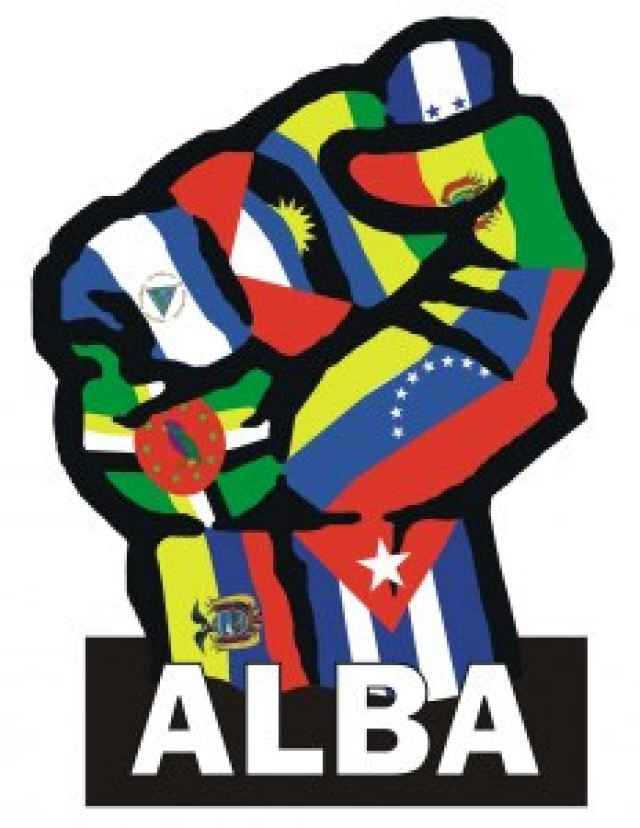
The Bolivarian Alliance of the Peoples of Our America (ALBA) is an anti-imperialist trading bloc first formed by the left-wing governments of Venezuela and Cuba to promote trade on the basis of solidarity rather than competition.
It has since expanded to include 11 nations, with Venezuela and Cuba joined by Bolivia, Ecuador, Nicaragua, Dominica, Antigua and Barbuda, St Vincent and the Grenadines, Saint Lucia, Grenada and Saint Kitts and Nevis. Honduras was an ALBA member, but was forced to withdraw when a 2009 US-backed coup installed a right-wing dictatorship.
The article below is based on a speech given by Canadian socialist John Riddell to a February 21 public meeting in Toronto. It is reprinted from his blog.
Today we celebrate a decade of achievement of the Bolivarian Alliance for the Peoples of Our Americas. For 10 years, ALBA has stood on the world stage as a defender of peace, solidarity and popular sovereignty.
Before ALBA, Cuba stood alone for many years against the US-led empire. But through ALBA, an alliance of countries, with wide influence and many friends among governments and peoples, now challenges imperialism on a range of issues.
Despite representing only a few small and poor countries, ALBA exercises great moral authority and carries weight in world affairs. ALBA is the most effective international alliance based on solidarity in modern history.
Nowhere has this been so clear as with regard to climate change, which profit-driven corporations have escalated into an existential crisis for humanity.
At the December governmental conference on climate change in Peru, Bolivia’s President Evo Morales, speaking for ALBA nations and the G77 group of developing countries, called for “a climate agreement based on an anti-colonialist vision”. He said it had to be based on the “learning of indigenous peoples”, on “protection of life and mother Earth” and “not on the market, profit, and capitalism”.
Yet the world’s great powers, once again, refused to take meaningful action to prevent catastrophic climate change. In response, the subsequent ALBA meeting in Cuba resolved to work towards a “world encounter of social movements” that would develop “a proposal to save life and humanity”.
This goal recalls the great conference in Cochabamba, Bolivia, in 2010, where more than 30,000 people from 100 countries, with leadership from Morales and ALBA countries, adopted a manifesto against capitalism’s devastation of Mother Earth.
Some have criticised ALBA countries for their failure to shut down oil and other environmentally harmful extractive industries. This is uncalled for. ALBA nations have endured economic pressure and even subversion.
To survive, they must sell what they can on the world market, and extractive products are almost the only thing that rich countries will buy. We should not advise poor countries to scale down exports in the face of such hostility.
Instead, we should focus on converting our own countries into loyal friends of Latin American peoples, that will assist them in pursuing a more ecologically sound path of economic development.
Throughout ALBA’s decade, its member countries have worked consistently against war. For example, four years ago, leading ALBA countries strongly opposed the war launched by a US-led alliance, including Canada, against the Libyan government.
Today, the disastrous results of this assault are plain to see: the Libyan state has been shattered and the country thrust into civil war.
Nicolas Maduro, then Venezuela's foreign minister, spoke prophetically in 2011, branding the attack as part of “a new cycle of colonial wars … without any limit to its destructive voracity”.
When a destructive civil war broke out in Syria later that year, progressive forces in Canada were of many minds regarding the nature of the conflict. But surely we can all now see how right ALBA countries were to oppose foreign intervention and urge a political solution in Syria.
No wonder, then, that ALBA nations have stood out in support of Palestinians, against Israel’s wars and taken action in the spirit of “Boycott, Divestment and Sanctions”.
At an anti-imperialist conference in Egypt in 2007, I heard delegates hail Hugo Chávez as “more Arab than the Arabs” for his bold stand against Israel’s wars.
And when last month a socialist, Alexis Tsipras, was elected prime minister of Greece, he was quickly in touch with Venezuela's government. Venezuela’s foreign minister Delcy Rodriguez will now be heading to Greece to work on agreements for cooperation.
During a visit to the Penobscot indigenous nation in Maine a few years ago, I found they were receiving material aid from Venezuela, in a program that also assisted Black communities in the United States.
The Bolivarians thus confirmed the vision of Malcolm X, murdered 50 years ago today, who saw the freedom struggle in the global South as a beacon of hope for his people. ALBA has set an example for such mutual assistance, in a spirit of solidarity, among its members and also with non-member countries in the region.
ALBA has provided us with a historic example of international anti-imperialist collaboration. Moreover, leaders of ALBA have argued for an alternative type of society, a socialist society. And once again socialism is being discussed not merely by narrow radical circles but, in many Latin American countries, by millions of working people.
All the more reason for us today to support Venezuela and its president, Nicolas Maduro, to support ALBA, and to spread knowledge of ALBA’s bold experiment in solidarity.
Like the article? Subscribe to Green Left now! You can also like us on Facebook and follow us on Twitter.